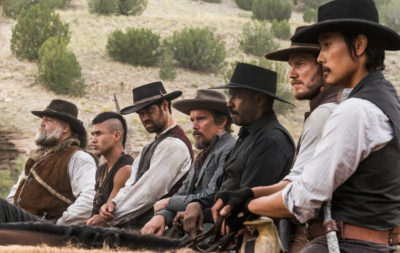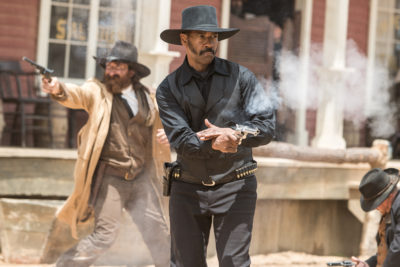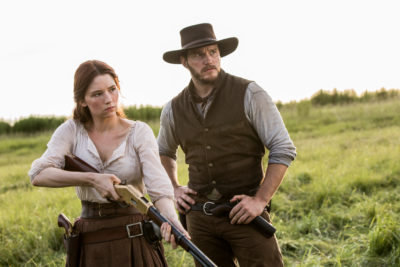
(l to r) Vincent D’Onofrio, Martin Sensmeier, Manuel Garcia-Rulfo, Ethan Hawke, Denzel Washington, Chris Pratt and Byung-hun Lee star in Columbia Pictures’ THE MAGNIFICENT SEVEN.
Antoine Fuqua’s The Magnificent Seven is not the movie that the John Sturges one was and that’s okay. Fuqua has a lot of fun playing with the clichés/tropes of westerns and succeeds in producing a fun movie that is most notable for having a uniquely integrated Seven – and least notable for having a villain who is an unmodulated black hole of evil that sucks the energy out of almost every scene he’s in.
Bartholomew Bogue (Peter Sarsgaard, an Education) wants to buy the farms/ranches around his mine to expand his operation. To that end he makes the people of Rose Creek an offer – $20 for each parcel of land. When Matthew Cullen (Matt Bomer, The Nice Guys)) objects, he guns him, and several others, down in the street – in front of his wife, Emma (Haley Bennett, Hardcore Henry).
Cut to Joshua Faraday (Chris Pratt, Guardians of the Galaxy) playing poker when Sam Chisolm (Denzel Washington) entering a bar and, after a bit of business, Chisolm shoots the bartender – who turns out to be a wanted man.
Emma Cullen comes into the picture again, asking Chisolm for help. He agrees after hearing her offer – everything the Rose Creek townspeople have. A series of introductions ensues that finds Chisolm gathering a very integrated group together to help the town: a black lawman/former Union officer (Chisolm); a hard-drinking Irish gambler/magician (Faraday); a fearsome mountain named Jack Horn (Vincent D’Onofrio, Daredevil); an ex-Confederate major with PTSD named Goodnight Robicheaux (Ethan Hawke, Boyhood) – and his Asian sidekick/guardian/blade man, Billy Rocks (Byung-Hun Lee, Terminator: Genisys, RED 2); a Comanche warrior called Red Harvest (Martin Sensmeier, Salem) whose medicine man told him he must ‘follow a different path’, and a Mexican gunfighter named Vasquez (Manuel Garcia-Rulfo, From Dusk Till Dark: The Series).

Denzel Washington stars in Columbia Pictures’ THE MAGNIFICENT SEVEN.
The first two acts of Fuqua’s Seven introduce all the main characters; give us a bit of a look at each’s strengths; and sets up the Seven’s plans for Bogue’s return.
Throughout, Fuqua plays with all the usual clichés: when Chisolm enters the bar through the swinging doors, everyone stops and looks up – before returning to what they were doing; when Bogue’s men come into town for the final battle, townspeople peek out windows and through rapidly closing doors – as well as subverting them (Robicheaux can’t fire his rifle because he suffers PTSD; the damsel in distress is neither a damsel nor incapable of joining in the carnage.
Washington plays Chisolm with a certain swagger and little moments of humor. Pratt’s Faraday gets the accentuated swagger, all of the broad humor and a few minutes of carefully timed drama – and pulls them all off. Most of the rest play single notes, but do it with genuine panache.

Haley Bennett and Chris Pratt in Metro-Goldwyn-Mayer Pictures and Columbia Pictures’ THE MAGNIFICENT SEVEN.
Bennett’s Emma might not one of the Seven, but she’s the focus of the film in terms of rage and pain. When she steps up to be the group’s sharpshooter, she’s deadly – fueled by a desire for both righteousness and vengeance. After her work here, I could see her becoming a sought after leading lady.
Mauro Fiore’s cinematography is frequently breathtaking – if you’re doing a western, you want some spectacular backdrops and Fiore delivers.
If only Sarsgaard’s Bogue wasn’t so colorless and unmodulated. Bogue has no sense of humor, no wit – nothing that makes him at all interesting (completely unlike Eli Wallach’s Calvera in the Sturges film). When he’s onscreen, he’s just not compelling enough to be there.
Given a better, more colorful villain, Fuqua’s The Magnificent Seven would be almost as much fun as Sturges’ take. As it is, it’s now the third best variation on Akira Kurosawa’s Seven Samurai (behind the Sturges film and Battle Beyond the Stars).
Final Grade: B